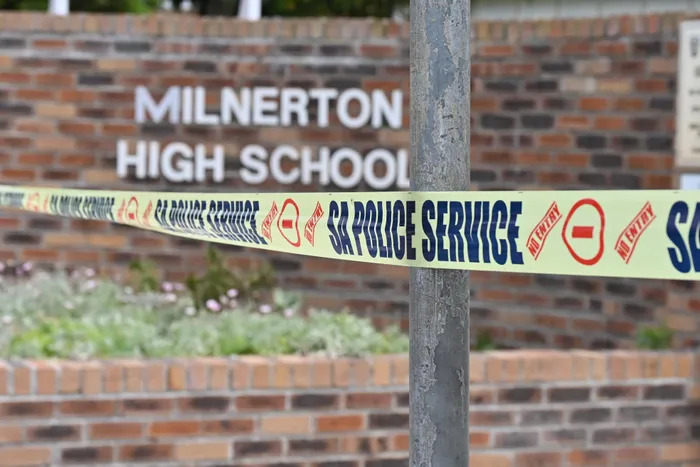‘Anti-bullying policies not enough’

Milnerton High cordoned off the entrance to the school.
Image: Ayanda Ndamane/Independent Newspapers
WHILE 69 cases of alleged bullying were reported to Safe Schools in the first half of the year, the Western Cape Education Department (WCED) has refused to disclose exactly how many schools have operational anti-bullying policies.
The province has come under the spotlight amid growing concerns over how the WCED handles bullying, following the assault of a 16-year-old Milnerton High School grade 10 pupil by several peers, in a video that subsequently went viral.
Six pupils have since been charged with assault in the Cape Town Magistrate’s court over the incident.
The Parliamentary portfolio committee on Basic Education recently told the Cape Times that there was no existing anti-bullying policy at Milnerton High School following its oversight visit last week.
WCED spokesperson, Bronagh Hammond said while the South African Schools Act does not mandate a standalone anti-bullying policy, schools were legally obligated to address bullying through their codes of conduct and broader safety and disciplinary frameworks.
“Many schools do choose to implement dedicated anti-bullying policies as part of best practice. Schools are also encouraged to implement a social media policy which addresses online bullying as well.”
In the first half of the 2025 school year, 69 cases of alleged bullying were reported to Safe Schools. Hammond further noted that there had been 65 expulsions for 2025 for serious misconduct.
“School discipline and procedures are governed by law, and the school needs to follow due process in this regard. The school will now hold a disciplinary hearing, and then based on that outcome determine a sanction, or recommend, to the Head of Department of the WCED, expulsion,” she said.
The Chairpersons of Parliament’s Social Services Cluster oversight committees discovered what they described as a culture of bullying at Milnerton High School.
During their media briefing on Monday Chairperson of the Portfolio Committee on Education, Joy Maimela, said: “The committee has been deeply concerned by the rising number of reported incidents in our schools, including physical, verbal, psychological and cyber bullying. Education cannot thrive in an environment of fear, and a learner who feels unsafe cannot learn while a teacher who fears discipline cannot teach effectively.”
Maimela said they’ve engaged with the schools, district, and the WCED on what actions are in place to ensure that such an “horrific incident” never happens again.
“What we have noted is that a majority of our schools do not have a comprehensive anti-bullying policy. What they do have is a code of conduct which just touches on the issue, but it is not a comprehensive policy. It does not give learners an understanding of what they should do when such instances happen or when they are affected by bullying.
“As a result, we have directed the department to assist all our schools, so that there are comprehensive anti-bullying policies and create reporting mechanisms that include learners being able to anonymously report incidents of bullying.”
Stellenbosch University professor of Philosophy of Education, Nuraan Davids, said while useful in directing desired behaviour in ideal contexts, policies and guidelines alone were not enough.
“Bullying can only be disrupted if every individual (teacher, coach, administrator, leader, manager, bursar, SGB member, parent) works towards a common goal of cultivating a particular ethos - one which is fundamentally opposed to any kind of violence, disrespect, discrimination, exclusion and marginalisation.
“Bullying can only be disrupted if teachers and principals demonstrate kindness, respect and care through their teaching and leadership. It is clearly not enough to expect policies to change behaviour, if the desired behaviour is not being made evident to young people. In the end, young people do what they see, not what they are told,” said Davids.
Leader of the Opposition in the provincial legislature, Khalid Sayed said: “While the WCED has indicated that schools “address bullying through their codes of conduct,” it is deeply concerning that there is no standardised or mandatory anti-bullying policy framework across all schools in the province."
Cape Times
Related Topics: